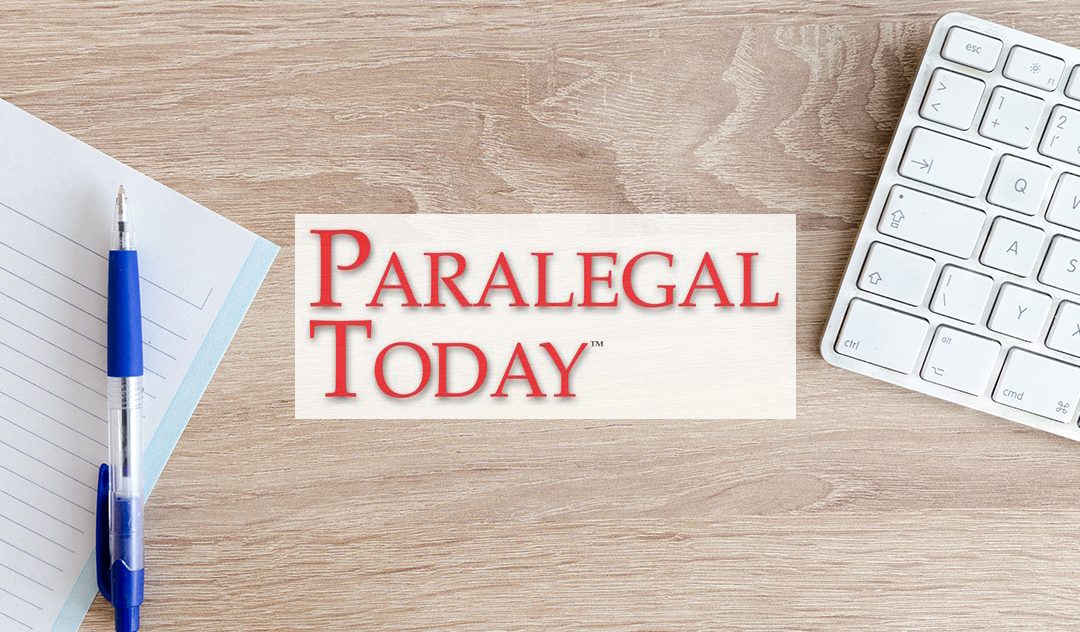Posts Tagged ‘legal nurse consultant’
The Unique Role of Legal Nurse Consultants in Litigation
Tuesday, February 6th, 2018
Have you ever interacted with a member of the opposing counsel’s team and noticed the designation “legal nurse consultant,” or”LNC,” after their name? Did you wonder what that individual’s role was or even what uniquely qualified them to be a legal nurse consultant? A legal nurse consultant is a registered nurse and a unique member of the litigation team. Legal nurse consultants bring their health-science education and clinical expertise to bridge the gap between healthcare and medically related issues in the litigation process. The primary role of a legal nurse consultant is to evaluate, analyze, and render informed opinions about the medical issues, delivery of healthcare, and resultant outcomes in the context of applicable legal standards.
Legal Nurse Consultant Role
Legal nurse consultants work in collaboration with attorneys, paralegals, and others involved in the legal process. The legal nurse consultant’s scope of practice does not include the practice of law or the functions of paralegals.
Professional nursing education and experience set the legal nurse consultant apart from other members of the litigation team. Just as nursing is firmly established as a separate profession apart from medicine within the healthcare field, so too is the role of the legal nurse consultant in the legal profession. Confusion about the specific roles, capabilities, and functions of the legal nurse consultant may arise because, in some settings, tasks assigned to the nurse may overlap with those of paralegals. Although many legal nurse consultants have acquired knowledge of the legal system through consulting with attorneys and attending legal seminars, legal education is not a prerequisite to the practice of legal nurse consulting-an important distinction between the legal nurse consultant and the paralegal. The particular legal nurse consultant’s role, however, may include a general working knowledge of the relevant substantive and procedural law and regulatory guidelines impacting the legal nurse consultant’s casework. This is especially important for legal nurse consultants working on mass tort or environmental contamination claims.
History of the Legal Nurse Consultant Role
No one knows exactly when nurses first gained recognition as legal nurse consultants since nurses have practiced as informal legal consultants to attorneys for decades. For more than 30 years, legal nurse consultants have acted as collaborators, strategists, and educators by offering support in medical-related litigation. As the specialty has evolved, so too have the practice areas where legal nurse consultants apply their skills.
During the 1980s, with the progression of nursing malpractice litigation, nurses were increasingly sought to opine on the standards of the nursing practice. Through the process of serving as expert witnesses, it became clear to attorneys that nurses were uniquely qualified to assist them in a myriad of ways outside of the courtroom.
The American Association of Legal Nurse Consultants (AALNC), founded in 1989, is dedicated to the professional enhancement and growth of registered nurses practicing in the specialty of legal nurse consulting, and the advancement of the nursing specialty. The AALNC published the first edition of its Scope of Practice and Standards in 1994, which guides the legal nurse consultant’s practice and professional performance. Certification for the legal nurse consultant subspecialty was developed by the American Legal Nurse Consultant Certification Board (ALNCCB), and the first Legal Nurse Consultant Certified (LNCC) certification exam was offered in 1998. The LNCC credential is the only legal nurse consultant certification recognized by the American Board of Nursing Specialties (ABNS) and the Accreditation Board for Specialty Nursing Certification.
In 2006, in collaboration with the American Nurses Association (ANA), AALNC updated the Scope & Standards of Practice for Legal Nurse Consulting. With this collaboration, the ANA officially recognized legal nurse consulting as a specialty practice of nursing.
Working with Legal Nurse Consultants
As a rule, lawyers look for case consultants who can translate complex issues into clear, simple terms understandable by the legal team, juries, and judges. Attorneys consult with legal nurse consultants because of their expertise in nursing and healthcare. Legal nurse consultants apply their education and experiential background to the medical legal issues in each case-evaluating and presenting complex medical information in a way that provides the litigation team with a greater understanding of the facts found in the medical record, providing these valuable services at a lower cost than a physician consultation.
Legal nurse consultants are appreciated not only for their ability to simplify the facts found in the record, but also for their ability to call attention to information that may have been omitted or falsified, protocols that were not followed, and possible “behind the scenes” considerations. Legal nurse consultants understand the nuances of the complicated healthcare system and can pick up on subtleties in the medical records that a non-medical professional might not. Typically, the more medically complex the case, the more a legal nurse consultant can contribute.
While the characteristics of each legal nurse consultant vary with respective experience levels and practice opportunities in general, successful legal nurse consultants possess unique core competencies, and consideration should be given to the following factors when soliciting nurse consultant services:
- Registered nurse with at least five years prior clinical experience
- Strong work ethic and high ethical standards
- Ability to work independently with minimal supervision and direction
- Willingness to accept responsibility for seeing projects through to conclusion
- Strong analytical skills; ability to express opinions logically and coherently
- Effective communication, teaching, and interpersonal skills
- Strong problem-solving skills
- Good organizational skills and ability to prioritize pending work projects
- Proficiency in medical literature searches and internet research
- Proficiency in computer programs such as Word, Adobe, Excel, etc.
- General working knowledge of the laws applicable to medical cases
Course-Based Credentials versus Specialty Certification
In most professions, certification in one’s area of expertise is the “best practice” methodology, and typically signifies a higher level of proficiency within a respective specialty practice. According to the ABNS, certification is the formal recognition of the specialized knowledge, skills, and experience demonstrated by the achievement of standards identified by a nursing specialty to promote optimal health outcomes. As awareness of the unique expertise of legal nurse consultants grows, more firms are requiring them to demonstrate experiential and educational achievements beyond entry-level competency. Certification in legal nurse consulting, although not required to practice within this specialty area, may soon become a key selection criteria considered by attorneys when soliciting the services of legal nurse consultants.
A general online search revealed upwards of thirty legal nurse consultant educational courses available nationwide. Many of these programs offer their participants various course-based “certifications” and “credentials” upon completion of the curriculum. However, only the ALNCCB maintains an experience based certification examination in legal nurse consulting and offers the only certification accredited by the ABNS. Examination and certification through the ALNCCB is available to licensed registered nurses with a minimum five years clinical experience, and an additional 2,000 hours of legal nurse consulting practice in the three years prior to taking the certification exam. Candidates achieving the minimal requirements for certification and successfully passing the required examination are granted the designation of Legal Nurse Consultant Certified.
The Legal Nurse Consultant and Nurse Expert Witness
In general, significant differences exist between legal nurse consultants and nurse expert witnesses. Many legal nurse consultants work “behind the scenes,” either in-house or independently as consulting experts, providing an informed, cost effective view on what can be highly specialized and complex medical issues. All work generated by the legal nurse consultant is considered privileged and confidential attorney-work product, and therefore is not subject to disclosure in discovery. Legal nurse consultants working behind the scenes do not typically offer expert testimony at depositions or at trial, and, consequently, remuneration for their services is less than nurses providing expert consultation.
Although nurse expert witnesses may engage in activities like those of the “behind the scenes” legal nurse consultants, it is also expected they will be willing to testify should the need arise. Nurse expert witnesses who testify in nurse malpractice claims possess experience and training like that of the plaintiff or defendant they are representing, and typically will have been practicing in a similar clinical environment contemporaneously to the event in question. Over the past few decades, expansion of the traditional role of the testifying nurse has provided for a greater recognition by the court that the professional most appropriate to define the nursing standard of care is a nurse. As such, many, but not all, nursing malpractice cases require testimony by a nursing expert witness to establish the standard of care.
Employment and Practice Areas
As a liaison between the legal and healthcare fields, legal nurse consultants practice in a variety of environments. Increasingly, many legal nurse consultants are self-employed and work from home, allowing for a flexible schedule and continued full or part-time clinical practice. Independent legal nurse consultants contract directly with entities handling medical-legal matters and bill hourly for their services. An in-house legal nurse consultant is typically a staff member of a law firm, insurance company, healthcare organization, or governmental agency, and their role varies greatly depending upon the size of the employer, the nature of the work, and the employer’s familiarity with the services legal nurse consultants can provide.
Legal nurse consultants provide support in medically related litigation and other medical-legal matters in a variety of practice areas including medical negligence, personal injury, product liability, worker’s compensation, toxic torts and mass tort class actions, fraud, abuse and regulatory compliance, criminal law, elder law, and life care planning.
Given the frequent changes in healthcare, it is likely that the list of practice settings for legal nurse consultants will continue to grow.
Embracing the Entire Legal Community
As the field of legal nurse consulting has grown, so have the opportunities for participation within the legal community, as bar associations and professional legal associations offer associate membership opportunities for legal nurse consultants. In June 2002, the West Virginia Bar Association invited legal nurse consultants to join the organization as associate members, becoming the first statewide bar association to create a special membership category for legal nurse consultants. Citing enhanced collegiality and an overall positive impact on membership, the WVBA encouraged other bar associations to follow suit in expanding associate memberships. Currently, opportunities for legal nurse consultant membership within the bar exist in several local, county, and state bar associations, including California, Florida, New York, Tennessee, Washington, and West Virginia.
The American Association for Justice accepts legal nurse consultants as paralegal affiliate members when sponsored by an AAJ member.
In 2014, The American Bar Association’s Health LawSection announced it had entered into a Memorandum of Understanding with the AALNC, setting forth the organizations’ common objectives regarding the education of legal and nursing professionals, and stating that they will work together to collaborate on programs and other initiatives where a mutual interest is present. This partnership is important to both organizations for the education and professional development it can provide their respective members.
Conclusion
Legal nurse consultants have carved out a niche in the legal world by providing invaluable, cost-effective expertise in medical-related litigation. Legal nurse consultants possess a unique understanding of healthcare issues and trends, and their services should be considered by individuals whose law practice requires even a basic knowledge of healthcare science and practices. For more information visit the American Association of Legal Nurse Consultants Web site at www.aalnc.org. To locate a legal nurse consultant or nurse expert in a specific geographic location or by area of expertise, visit the LNCLocator at www.aalnc.org/page/Inc-locator.
 Founded by Alicia Davis, RN, LNCC, Med Law Advisory Partners (formerly ALN Consulting) provides resources and expertise in the areas of health care litigation and health systems improvement. Med Law Advisory Partners’ team has had the privilege of working with national and regional healthcare systems, legal firms, insurers, and senior-living operators for nearly 20 years, providing medical-legal case investigation.
Founded by Alicia Davis, RN, LNCC, Med Law Advisory Partners (formerly ALN Consulting) provides resources and expertise in the areas of health care litigation and health systems improvement. Med Law Advisory Partners’ team has had the privilege of working with national and regional healthcare systems, legal firms, insurers, and senior-living operators for nearly 20 years, providing medical-legal case investigation.
Originally published February 6, 2018. Post last reviewed and updated February 25, 2021.
Fighting Fire with Fire: How a Legal Nurse Consultant Can Help Defend Medical Malpractice Claims
Thursday, February 4th, 2016
Medical malpractice claims in 2015 were on the rise for the second year in a row. In 2014, $3.8 billion in payouts were awarded to claimants and plaintiffs alleging malpractice, according to Diederich Healthcare. Malpractice claims exceeded $713 million for New York State alone. Altogether, the quantity of claims increased 4.4 percent compared to 2013 — the second increase in two years.
Many malpractice insurers are hemorrhaging money as a result of these claims. One method they can try to reduce the size of settlements is to consult a legal nurse to analyze the data and determine whether the damages are to the extent the claimant alleges.
A growing numbers of plaintiffs are already using this same tact to increase the size of their claims. Legal nurse consultants were able to analyze data and case histories in order to bolster the claimant’s argument for a larger settlement. Without a legal nurse consultant of their own, many defense attorneys representing insurance carriers were unable to counter the compelling evidence set forth by the plaintiff.
Now, insurance carriers are recognizing the need for a legal nurse consultant in order to ensure a more accurate and complete analysis of the case’s circumstances. Defense attorneys who do not keep pace with this trend will soon find themselves outmatched in a profession that concerns itself exclusively with persuasive matters of fact.
Legal Nurse Consultants Make Worthy Opposition
In the legal consulting world, each side does their best to examine the case in an objective manner while still singling out the details that can benefit the client they are helping represent. A single expert witness for the plaintiff can clinch the outcome in their favor.
Meghan D’Angelo was one such clincher. She was once called in to provide an objective confirmation on whether or not a hospital followed protocol. Her plaintiff, who was tragically deceased, had died as a result of complications from falling out of bed. The plaintiff’s family and representing lawyer simply wanted to know if the hospital had breached protocol by allowing the patient’s bed rails to be left down.
What she found went far deeper than bed rails. As D’Angelo analyzed the case report and medical records, she discovered that the patient was given the wrong dose of a medication that had sedating side effects — twice. She also noticed that the nursing staff did not exercise their full diligence when performing the patient’s assessment.
This discovery transformed D’Angelo’s role from a one-note confirmation to a full-blown consultant who worked with the case for two months. “We’re looking from a high level down to a detailed level,” D’Angelo told the Daily Record. “I’ll say, ‘Look, let’s not only focus on what happened at the bedside, but also, were the hospital policies and procedures followed?’”
Countering Knowledge with Knowledge
No one can say for certain, but it is likely that the defense attorney was dumbfounded upon D’Angelo’s discovery. Without a legal nurse consultant of their own, they could have easily been blindsided by the information and not in a strong enough position to dispute the findings.
Having a legal nurse at your side allows your case to respond in a tit-for-tat manner with the plaintiff’s own expert consultant. Many nuances and complex details surrounding patient medical records could make the typical paralegal’s head spin. A legal nurse, though, can respond in kind and work to bring a full spectrum of opinions and findings to the defense.
In fact, a legal nurse consultant can come into play countless times during a discovery and case-building period. The American Association of Legal Nurse Consultants outlines an entire process that can be extremely difficult for someone without a medical background to handle.
Even if your case is not going to litigation or your claimant has not consulted a legal nurse of their own, relying on a legal nurse could potentially save insurers thousands or more. Many insurers are already recommending that attorneys hire legal nurse consultants in order to view the claim from a professional standpoint.
To make sure that your legal team does not get out of their depth and can keep settlements as low as possible, strongly consider the increasingly-common recommendation of insurers and hire a legal nurse to bolster your case. Your client just might not be able to afford for you not to.